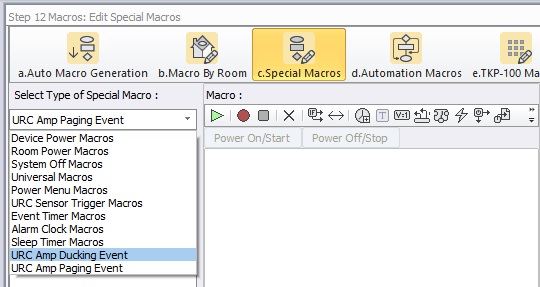URC HDA devices and software provide countless options to configure and optimize audio settings to achieve performance and flexibility for almost any application.
Two of those features are Paging Events and Ducking Events.
The following article provides a better understanding of the differences between Paging Events and Ducking Events and the reason to use a Paging Event vs a Ducking Event for your specific application. Additional articles detail the procedure for creating the different events when using Accelerator 3 and Flex 2 software.

Location of Paging & Ducking Events in Accelerator 3 software - Step 12c
Page Events:
Paging Events can power ON zones that are OFF.
Because of this, Paging Events are more suited for use when you need alert tones in the system.
This could be for a doorbell interrupt, alarm clock, audible automation cues based on sensors, and core system functions that you want to provide alerts regardless of a zone's power state.
Paging Events should be initiated by something that "affects" the system, like a sensor state, a logic variable or even a time variable.
Ducking Events:
Ducking Events are designed to be used to customize the playing audio of a zone.
This is especially useful in commercial applications. Ducking Events provide the ability to play one input over another input – a maximum of two inputs can be played simultaneously in a zone when using a Ducking Event. The inputs used in a Ducking Event can be an unbalanced analog input, balanced analog input, digital input, microphone input or a stored HDA Sound File.
Ducking Events do not support controlling the power state of a zone.
While Ducking Events can be triggered by logic, they are most useful when triggered by the system operator, customizing the audio playing in a zone.
For example, in a sports-bar application, the system operator may want to Duck in a hockey score siren *.wav file stored in the HDA unit to the playing audio when the home team scores.
The Ducking Event can run on a timer, so that when the hockey score siren .wav file completes playing, the affected zones return to their normal volume.
Ducking Events also give you the ability to blend two inputs together in a zone, such as two microphones, providing a two-microphone "Mixer" event in a zone.
You can also blend two sound files together, or a sound file with a microphone.
Ducking Events are also very useful in a commercial environment such as a grocery store, where you want timed advertisement .wav files periodically Ducking on top of the Muzak® playing in the store.
There are more and more examples, small sporting events, community centers, etc.
Additional Information & Resources:
Please also refer to this article describing when to use sound & audio files in a Paging Event.
Please also refer to this article describing when to use sound & audio files in a Ducking Event.
To learn more about HDA products and programming, please see the HDA Programmers Guide or the Accelerator 3 online Programming Guide.
